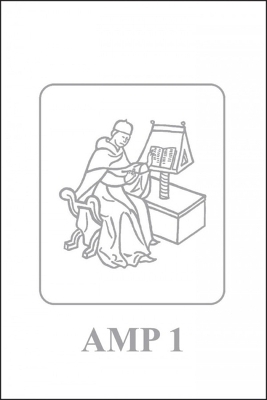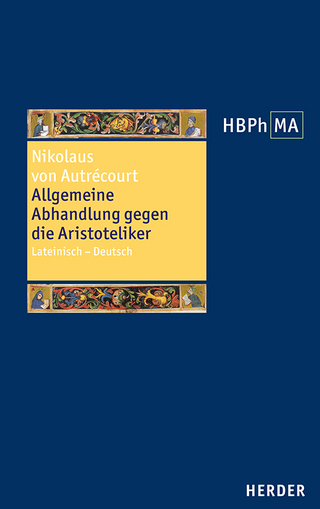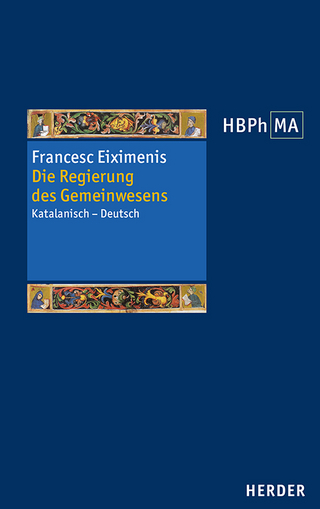
The Soul-Body Problem at Paris, ca. 1200–1250
Leuven University Press (Verlag)
978-90-5867-802-7 (ISBN)
- Lieferbar (Termin unbekannt)
- Versandkostenfrei
- Auch auf Rechnung
- Artikel merken
The soul-body problem was among the most controversial issues discussed in 13th century Europe, and it continues to capture much attention today as the quest to understand human identity becomes more and more urgent. What made the discussion about this problem particularly interesting in the scholastic period was the tension between the traditional dualist doctrines and a growing need to affirm the unity of the human being. This debate is frequently interpreted as a conflict between the ‘new' philosophy, conveyed by the rediscovered works of Aristotle and his followers, and doctrinal requirements, especially the belief in the soul's immortality. However, a thorough examination of Parisian texts, written between approximately 1150 and 1260, leads us to conclusions which may seem surprising. In this book, the study and edition of some little-known texts of Hugh of St-Cher and his contemporaries reveals an extremely rich and colourful picture of the Parisian anthropological debate of the time. This book also offers an opportunity to reconsider some received views concerning medieval philosophy, such as the conviction that the notion of ‘person' did not play any major role in the anthropological controversies. The study covers a wide range of authors, from Gilbert of Poitiers to Thomas Aquinas, and it is partly based on previously unedited material, published for the first time in the Appendix.
Magdalena Bieniak holds a PhD in Philosophy (University of Padua and University of Paris IV - Sorbonne). She holds a research fellowship at the Department of Philosophy of the University of Padua and is affiliated with the University of Warsaw.
Acknowledgements
Introduction
Part One
Towards the unity of the Human Being
1.1 Accidental union of the soul with the body and unibilitas substantialis of the human soul
1.1.1 The accidental union of the soul with the body
1.1.1.1 Avicenna and early Avicennianism
1.1.1.2 Philip the Chancellor's Summa de bono
1.1.2 The unibilitas substantialis of the human soul: Hugh of St-Cher and his contemporaries
1.1.2.1 William of Auxerre
1.1.2.2 Hugh of St-Cher's question De anima
1.1.2.3 Roland of Cremona
1.1.2.4 William of Auvergne
1.1.3 Unibilitas substantialis after Hugh of St-Cher
1.1.3.1 John of La Rochelle
1.1.3.2 Albert the Great
1.1.3.3 Bonaventure
1.1.3.4 Thomas Aquinas
1.2 The human soul and the concept of person
1.2.1 "The human soul is not a person". The Sentences Commentary of Hugh of St-Cher
1.2.2 Evolution of expressions
1.2.2.1 Gilbert of Poitiers
1.2.2.2 Pseudo-Peter of Poitiers and Simon of Tournai
1.2.2.3 Alan of Lille
1.2.2.4 Stephen Langton
1.2.2.5 William of Auxerre
1.2.2.6 Hugh of St-Cher
1.2.3 "The separated soul is not a person". Controversies and misunderstandings
1.2.3.1 From the question of universals to the individuality of the soul: Gilbert of Poitiers
1.2.3.2 Simon of Tournai
1.2.3.3 From logic to psychology: Alan of Lille
1.2.3.4 Stephen Langton
1.2.3.5 William of Auxerre
1.2.3.6 Hugh of St-Cher
1.2.3.7 Alexander of Hales
1.2.3.8 Philip the Chancellor
1.2.3.9 From the Summa Halesiana to Thomas Aquinas's Scriptum in Sententias
Part Two
Between Soul and Body: the Powers of the Soul
Introduction
2.1 The Rational Powers: the Soul as Image of the Trinity
2.1.1 Two Traditions, Two Types of Powers
2.1.2 The identity of the soul with its powers
2.1.2.1 The Augustinian and Pseudo-Augustinian heritage
2.1.2.2 William of Auxerre
2.1.2.3 Hugh of St-Cher
2.1.2.4 An anonymous question (ms. Douai 434, n. 115)
2.1.2.5 Philip the Chancellor and Alexander of Hales
2.1.2.6 Peter of Bar
2.2 The Sensitive and Vegetative Powers
2.2.1 The Union per medium
2.2.1.1 Philip the Chancellor
2.2.1.2 Sources of the doctrine of intermediaries
2.2.1.3 Hugh of St-Cher
2.2.2 The Survival of the Sensitive and Vegetative Powers
2.2.2.1 Hugh of St-Cher
2.2.2.2 Avicenna and Dominicus Gundissalinus
2.2.2.3 Quaestiones antequam esset frater
2.2.2.4 Peter of Bar
2.2.2.5 William of Auvergne
2.3 The Problem of Memory
2.3.1 Two traditions, two types of memory
2.3.2 Philip the Chancellor
2.3.3 The Summa Duacensis
2.3.4 The disputed questions of Peter of Bar
2.3.5 The Gloss of Alexander of Hales
2.3.6 John of La Rochelle
2.3.7 William of Auvergne's De anima: memory, the immortality of the soul and the resurrection
Conclusion
Appendix : Text Editions
Introduction
(A) The disputed questions (Douai 434)
(B) Hugh of St-Cher's Sentences Commentary (I, 3)
(C) Abbreviations
Texts
(A) Hugo de Sancto Caro
(B) Hugo de Sancto Caro
(C)
(D) Anonimi Si anima est sue potentie
(E) Petrus de Barro De hiis que ex parte anime manebunt
(F) Anonimi
Bibliography
(A) Journals and Series
(B) Manuscripts
(C) Edited Sources
(D) Studies
Indices
| Reihe/Serie | Ancient and Medieval Philosophy–Series 1 |
|---|---|
| Übersetzer | Raffaella Roncarati |
| Verlagsort | Leuven |
| Sprache | englisch |
| Maße | 152 x 229 mm |
| Themenwelt | Geisteswissenschaften ► Philosophie ► Philosophie des Mittelalters |
| Geisteswissenschaften ► Religion / Theologie | |
| ISBN-10 | 90-5867-802-4 / 9058678024 |
| ISBN-13 | 978-90-5867-802-7 / 9789058678027 |
| Zustand | Neuware |
| Haben Sie eine Frage zum Produkt? |
aus dem Bereich


